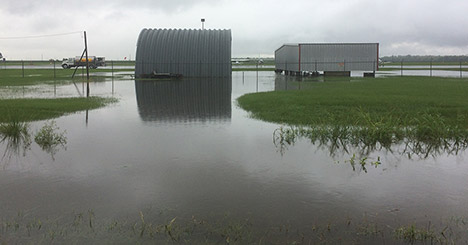
Aug. 30, 2017
As Tropical Storm Harvey moved into Louisiana, state and local aviation officials worked to ensure their airports were ready to support recovery efforts. By Wednesday, Aug. 30 the only public-use airport in the Bayou State that was temporarily closed during the storm – Chennault International Airport (CWF) in Lake Charles – had reopened.
Bradley Brandt, aviation director for Louisiana’s transportation department, said that other airports along the Louisiana Gulf Coast had remained open during the storm, with generally minimal operational impacts. In fact, early on, U.S. Coast Guard and U.S. Marine Corps helicopters flew relief and rescue operations from Southland Airport (UXL) in Sulphur.
Brandt said, “Although most of our state’s airports are locally owned and operated, in times of crisis our office acts as a conduit for any requests for information, or for any specific requests from airports requiring coordination between the local level, the governor’s Office of Homeland Security and Emergency Preparedness, and with federal departments such as Homeland Security and the FAA.”
Recovery efforts have also benefitted from a program underway to equip all Louisiana public-use airports with emergency backup generators, so that runway lighting and navigation aids remain operational during area power outages. Eighty-two percent of the state’s airports are so equipped, according to Brandt.
In order to further expedite recovery operations, Brandt said, “Our office stands ready to provide affected airports with any emergency funding necessary for post-recovery repairs to runways, ramps and other damaged aviation infrastructure.”
Brandt is keeping close watch on other Louisiana airports along the storm track, including Port of South Louisiana Executive Regional Airport (APS) northwest of New Orleans, and Shreveport Downtown Airport (DTN) that is surrounded on three sides by the Red River.
Harvey relief flights flown by business aircraft are being coordinated in part through NBAA’s Humanitarian Emergency Response Operator (HERO) Database – a list of people in the business aviation community who are available for disaster-response mobilization efforts in the aftermath of major crises. Learn more about the HERO database.


 International Business Aviation Council Ltd.
International Business Aviation Council Ltd.